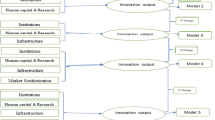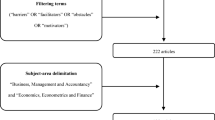Abstract
This paper explores the regional innovation paradox and its policy implications. The regional innovation paradox refers to the apparent contradiction between the comparatively greater need to spend on innovation in lagging regions and their relatively lower capacity to absorb public funds earmarked for the promotion of innovation and to invest in innovation related activities compared to more advanced regions. Empirical analysis of the nature of the paradox shows that there are strong complementarities between business, education and government spending on R&D and that technology/innovation policy and industrial policies tend to work in opposite directions. Our analysis suggests that resolution of the paradox requires policies that: (i) increase the innovation capacity of regions by working both on the demand and the supply side of the system to increase both private and public sector investment in innovation activity; and (ii) integrate technology policy and industrial policy by encouraging expenditure on innovation activity within mainstream industrial policy programmes. The penultimate section of the paper outlines and assesses policy initiatives/experiments along these lines and suggests how they might be developed in the future.
Similar content being viewed by others
References
Asheim, B.T., 1998, ‘Learning Regions as Development Coalitions: Partnership as Governance in European Workfare States?’, Paper Presented at the second European Urban and Regional Studies Conference on ‘Culture, Place and Space in Contemporary Europe’, University of Durham, UK, September 17-20, 1998.
Autio, E., 1998, ‘Evaluation of R&TD in Regional Systems of Innovation’, European Planning Studies 6 (2).
Bellini, N., 1998, ‘services to Industry in the Framework of Regional and local Industrial Policy’, Draft Paper OECD Modena Conference on ‘Up-Grading Knowledge and Diffusing Technology to Small Firms: Building Competitive Regional Environments’, May 28-29.
Boekholt, P., E. Arnold, and L. Tsipouri, 1998, ‘The Evaluation of the Pre-Pilot Actions under Article 10: Innovative Measures Regarding Regional Technology Plans’, Report to the European Commission.
Braczyk, H. and M. Heidenreich, 1998, ‘Regional Governance Structures in a Globalized World’, in H. Braczyk, P. Cooke and M. Heidenreich (eds.), Regional Innovation Systems, London: UCL Press.
CEC, 1994, Growth, Competitiveness, Employment: The Challenges and Ways Forward into the 21st Century, White Paper, Brussels.
Coleman, J., 1994, Foundations of Social Theory, Cambridge, MA: Belknap.
Cooke, P., 1998, ‘The Role of Innovation in Regional Competitiveness’, in J. Cobbenhagen (ed.), Conference Proceedings, Maastricht, The Netherlands, May 28-29, 1998, Cohesion, Competitiveness and RTDI: Their Impact on Regions.
Cooke, P., 1998, ‘Introduction: Origin of the Concept’, in Braczyk, Cooke, and Heidenrich (eds.), Regional Innovation Systems, London: UCL Press.
Cooke, P., 1999, ‘Regions in a Global Market: The Experiences of Wales and Baden Württemberg’, Review of International Political Economy 4 (2), 349-381.
DTI, 1994, Competitiveness, White Paper, Cm2563, London: HMSO.
DTI, 1995, Competitiveness: Forging Ahead, White Paper, Cm 2867, London: HMSO.
DTI, 1998, Our Competitive Future: Building the Knowledge Driven Economy, White Paper Cm4176, London, The Stationery Office.
Ecotec, 2000, Final Report of the On-going Evaluation of the Regional Innovation Strategies Under Article 10 of the ERDF, Ecotec: Research and Consulting Ltd.
Etzkowitz, H. and L. Leydesdorff, (eds.), 1997, Universities in the Global Knowledge Economy: A Triple Helix of University-Industry-Government Relations, London: Cassell Academic.
Etzkowitz, H. and L. Leydesdorff, 2000, ‘The Dynamics of Innovation: FromNational Systems and “Mode 2” to a Triple Helix of University-Industry-Government Relations’, Research Policy 29 (2), 109-123.
Eurostat, 2000, Regions Statistical Yearbook 1999, Luxembourg: European Commission.
Henderson, D. and K. Morgan, 1999, ‘Regions as Laboratories: The Rise of Regional Experimentalism in Europe’, in D. Wolfe and M. Gertler (eds.), Innovation and Social Learning, North America: Macmillan, St. Martins Press.
Howells, J. 1999, ‘Regional Systems of Innovation?’, in D. Archibugi, J. Howells, and J. Michie (eds.), Innovation Policy in a Global Economy, Cambridge: Cambridge University Press.
Kay, J. and D. Thompson, 1986, ‘Privatisation: A Policy in Search of a Rationale’, Economic Journal 18-32.
Koschatzky, K., 1998, ‘Firm Innovation and Region: The Role of Space in Innovation Processes’, International Journal of Innovation Management 2 (4), 383-408.
Landabaso, M., 1997, ‘The Promotion of Innovation in Regional Policy: Proposals for a Regional Innovation Strategy’, Entrepreneurship and Regional Development 9, 1-24.
Leydesdorff, L. and M. Curran, 2000, ‘Mapping University-Industry-Government Relations on the, Internet and the Construction of Indicators for a Knowledge-Based Economy’, Presented at the Third Triple-Helix International Conference, Rio de Janeiro, April 2000.
Leydesdorff, L., 2000, ‘The Triple Helix: An Evolutionary Model of Innovations’, Research Policy 29 (2), 243-255.
Lundvall, B.A., (ed.), 1992, National Systems of Innovation: Towards a Theory of Innovation and Interactive Learning, London: Pinter Publishers.
Lundvall, B.A. and S. Borras, 1997, ‘The Globalising Learning Economy: Implications for Technology Policy’, Final Report under the TSER Programme, EU Commission.
Lundvall, B.A., 1999, ‘Technology Policy in the Learning Economy’, in D. Archibugi, J. Howells, and J. Michie (eds.), Innovation Policy in a Global Economy, Cambridge: Cambridge University Press.
Marshall, A., 1920, Industry and Trade, 3rd ed. London: Macmillan (first published 1919).
Marshall, A., 1930, Principles of Economics, 8th ed., London: Macmillan (first published 1890).
Morgan, K., 1997, ‘The Learning Region: Institutions, Innovation and Regional Renewal’, Regional Studies 31 (5), 491-503.
Nauwelaers, C., D.R. Charles, and B. Mouton, 2000, ‘Assessment of the RITTS Scheme’, Paper Presented at the RIS-RITTS Network Meeting, Madrid.
Nauwelaers, C. and A. Reid, 1995, Innovative Regions, Brussels: European Commission.
Nelson, R. 1996, The Sources of Economic Growth, Cambridge, MA: Harvard University Press.
Oughton, C. and G. Whittam, 1997, Competition and Cooperation in the Small Firm Sector', Scottish Journal of Political Economy 44 (1), 1-30.
Author information
Authors and Affiliations
Rights and permissions
About this article
Cite this article
Oughton, C., Landabaso, M. & Morgan, K. The Regional Innovation Paradox: Innovation Policy and Industrial Policy. The Journal of Technology Transfer 27, 97–110 (2002). https://doi.org/10.1023/A:1013104805703
Issue Date:
DOI: https://doi.org/10.1023/A:1013104805703




